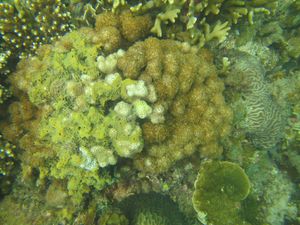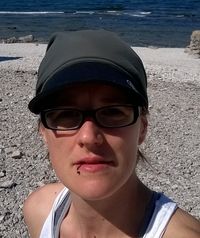DR. Swantje Enge
Tel.: +49-(0)4421-944-215
Fax: +49-(0)4421-944-140
E-Mail: swantje.enge@uni-oldenburg.de
Standort:
ICBM Terramare
Schleusenstraße 1
26382 Wilhelmshaven
Germany
Location/Route
Swantje Enge
Swantje Enge, Dr.
Research project
I am a postdoc within the MARBAS project, which was initiated to strengthen collaborations within marine ecosystems and biodiversity research between the ICBM and the University of Bremen.
My general research interests focus on chemical-mediated interactions between organisms, benthic community ecology and marine invasion ecology. Within the MARBAS project I will work with tropical coral reefs, which are the most diverse communities in marine ecosystems and provide services and nutrition to billions of humans. Due to various human actions, e.g. climate change, overfishing, eutrophication or increased sedimentation, coral reefs are declining worldwide and have been reported to undergo phase-shifts from coral dominated to algae or sponge dominated reefs causing profound changes in biodiversity and ecosystem functioning. This project aims to identify factors and mechanisms by which corals are outcompeted by other benthic organisms. For this purpose, I am currently investigating the interaction of corals with the sponge Pseudoceratina sp. that forms dense patches and can overgrow live corals at our study sites on Ko Phangan, Thailand.

Coral of the genus Goniopora overgrown by the sponge Pseudoceratina sp.
Professional experience
- From 2016 Postdoc at the University of Oldenburg; Germany
- 2014-2016 Postdoc at the University of Copenhagen, Denmark
- 2013-2014 Researcher at the University of Gothenburg, Tjärnö, Sweden
Education
- 2008-2013 PhD-student at the University of Gothenburg, Tjärnö. Sweden on the project “Seaweed invasions and novel chemical defences”
- 2007-2008 Research Assistant at the University of Oldenburg, Germany and University of Gothenburg, Tjärnö, Sweden
- 2001-2007 Study of Marine Environmental Sciences at the University of Oldenburg, Germany
Publications
Sagerman, J, Enge, S., Pavia, H., and S.M. Wikström (2015). Low feeding preference of native herbivores for the successful non-native seaweed Heterosiphonia japonica. Marine Biology,162, 2471-2479.
Sagerman, J, Enge, S., Pavia, H., and S.A. Wikström (2014). Divergent ecological strategies determine different impacts on community production by two successful non-native seaweeds. Oecologia, 175, pp. 937-946.
Enge, S., Nylund, G.M., and H. Pavia (2013). Native generalist herbivores promote invasion of a chemically defended seaweed via refuge-mediated apparent competition. Ecology Letters, 16, pp. 487-492.
Nylund, G.M., Enge, S., and H. Pavia (2013). Costs and benefits of chemical defence in the red alga Bonnemaisonia hamifera. PLOS ONE, 8, e61291.
Enge, S., Nylund, G.M., Harder, T., and H. Pavia (2012). An exotic chemical weapon explains low herbivore damage in an invasive alga. Ecology, 93, pp. 2736-2745.
Baumgartner, F., Cervin, G., Enge, S., Kubanek, J., Pavia, H., Nylund, G.M., Selander, E., Svensson, J.R., and Toth, G.B. (2012). Chemical defences against herbivores. In: Chemical ecology in aquatic systems (Eds: C. Brönmark and L.A. Hansson). Oxford University Press, New York, pp. 210-235. ISBN/ISSN: 978-0-19-958309-6



![[Translate to English:]](/f/5/_processed_/3/2/csm_ICBM-Logo-transparent-_91fe1c6774.png)
